2018 - 2019 Cohort
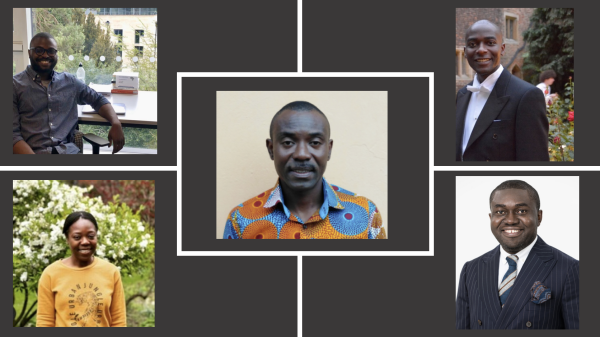
These are photos of the fourth cohort of PhD students sponsored by Cambridge-Africa when they started in the academic year 2018/2019.
Starting from top left: Anye, Tony, Chilombo, Oliver and Emmanuel (centre)
Find out what they are up to below:
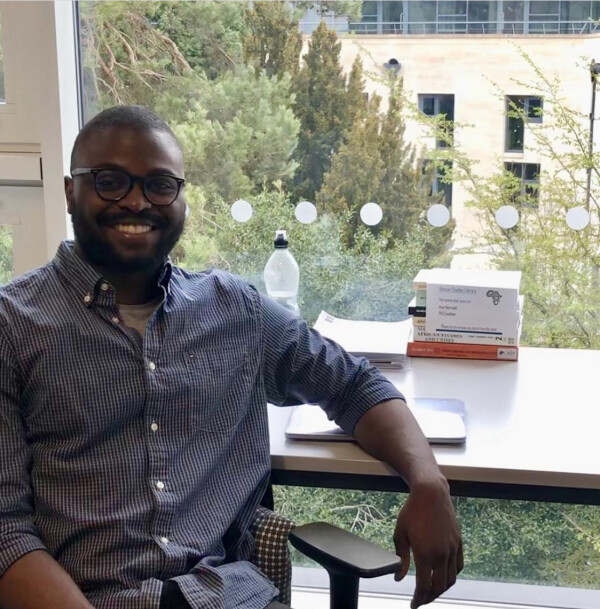
Dr Anye-Nkwenti Nyamnjoh
| Full name | Anye-Nkwenti Nyamnjoh |
| PhD project | Decolonisation, Africanisation, and Epistemic Citizenship in post-Rhodes Must Fall South African Universities |
| PhD Supervisor (Department) | Prof. Adam Branch, Politics and International Studies (POLIS) |
| Year of completion | 2022 |
| anyenyamnjoh@gmail.com |
WHERE ARE YOU AT THE MOMENT? |
| I got married in October 2021, successfully defended my PhD in March 2022, and will be graduating on October 22nd 2022. I will also be joining the Human Sciences Research Council’s Inclusive Economic Development unit as a researcher. This is a one-year contract position and intend to use this relative security to find more stable medium to long-term employment. I am interested in and applying for lecturer and researcher positions in South African universities. |
TELL US ABOUT YOUR TIME AT THE UNIVERSITY OF CAMBRIDGE |
| I have fond memories of my time in Cambridge. I came here from Cameroon via South Africa, having attended the University of Cape Town until my Masters. I distinctly remember stepping out of the train station and feeling an overwhelming sense of belonging. Cambridge genuinely felt like a student town, and that came with an immediate sense of feeling at home. This feeling only grew as I began to settle, both in terms of what was familiar to me— finding a barber and store that sold plantain, joining my college football team (Trinity Hall), and discovering which college parties played Afrobeats (always Wolfson!)—and all the new experiences that lay before me. I loved experiencing the unique beauty that comes with being a student at Cambridge—the parks, architecture, punting, formals, and rich sense of heritage and tradition. I even got used to the weather. While I am appreciative of the education I got here, I am perhaps most grateful for the friendships I made. In a sense, this distinction is immaterial as they were often co-constitutive. Sharing my wedding day with friends from Cambridge who braved the uncertainty and insecurity of the pandemic world is something for which I’ll be eternally thankful. And of course, I will fondly remember my college MCR football team for the thoroughly enjoyable Sundays. I gave everything for these lads, including both hamstrings and my lower back. |
TELL US ABOUT YOUR EXPERIENCE SINCE LEAVING THE UNIVERSITY OF CAMBRIDGE |
| My current year-long research position at the HSRC offers time to publish from my dissertation and seek more medium-long term employment. Though this is going well, I miss the routine of my PhD life in quiet Cambridge. A more noteworthy adjustment has been the lack of access to a university library, as the university arrests this privilege almost immediately upon one’s completion. Could Cambridge Africa look into this for future students? Perhaps an additional 6-month library access extension period after one’s PhD has been approved by the degree committee and student registry |
ALUMNI WISDOM (what can you tell current Cambridge-Africa PhD scholars) |
|
Cambridge is a wonderful citadel of learning. At the same time, it would be irresponsible to downplay the moments of non-belonging that black and African students may feel during their time here. Admittedly, there is scope for institutional correction. Nonetheless, at an individual level, I hope that new students do not take for granted the importance of social connection and the vitality it offers. Seek out, immerse, and enjoy yourself in the varied communities Cambridge has to offer. For me, they were the rituals of friendship and playing for my MCR football team. It could be something else for you, like faith-based spaces. Belonging is an initiative you ought to take for yourself, though I admit it is not wholly determined by you. Secondly, belonging is something you provide for one another. Together, affirm for one another that Cambridge is your space too and that you belong. While the PhD is intellectual rewarding, I found the social relations we cultivate around it much more stimulating. The journey is emotionally gruelling, but in the words of urban poet Kendrick Lamar (2015) “We gon' be alright. We gon' be alright. Do you hear me, do you feel me? We gon' be alright.” |
Publications |
|
Swartz, S., A. Nyamnjoh, Arogundade, E., Breakey, J., Bockarie, A., & Osezua, O. C. (2022). “Cultivating moral eyes: Bridging the knowledge-action gap of privilege and injustice among students in African universities.” Journal of Moral Education, 51(2), 186-203 Nyamnjoh, A., S. Swartz, K.C. Motha & Z. Radasi (2021). “The contribution of theories of personhood in the revaluation of children in African societies.” Current Sociology. Nyamnjoh, A., S. Swartz, B. Roberts, S. Gordon & J. Struiwig (2020). “Worlds Apart: Social attitudes to restitution in South Africa.” Strategic Review for Southern Africa 42(1), 13-40. Swartz, S., A. Nyamnjoh, Roberts, B., & Gordon, S. (2020). “The ‘Fuck White People’ Phenomenon in South Africa: A Discursive and Statistical Analysis.” Politikon, 47(2), 136- 158. Swartz, S., A. Nyamnjoh & A. Mahali (2020). “Decolonising the Social Sciences Curriculum in the University Classroom: A Pragmatic-realism Approach.” Alternation, 36, pp.165 – 187. Nyamnjoh. A. and T.M. Luescher (2023, forthcoming). “Academic freedom, students and the decolonial turn in South Africa.” In Watermeyer, R., R. Raaper and M. Olssen (eds). Handbook on Academic Freedom Nyamnjoh, A. and R. Morrell (2021). “What is Southern Theory and how does it aid in engaging Southern youth?” In Swartz, S., A. Cooper, C. Batan & L.K. Causa (eds) (2021). The Oxford Handbook on Global South Youth Studies. NY: Oxford University Press. Breakey, J., Nyamnjoh, A., & Swartz, S. (2021). “Researching the south on its own terms as a matter of justice.” In The Oxford Handbook of Global South Youth Studies. In Swartz, S., A. Cooper, C. Batan & L.K. Causa (eds) (2021). The Oxford Handbook on Global South Youth Studies. NY: Oxford University Press. Nyamnjoh A. & Lester, C. (2019). “Global and African discourses on citizenship.” In Hazama, I., Umeya, K., & Nyamnjoh, F. B. (eds) Citizenship in Motion: South African and Japanese scholars in conversation. Langaa RCPIG: Cameroon.
|
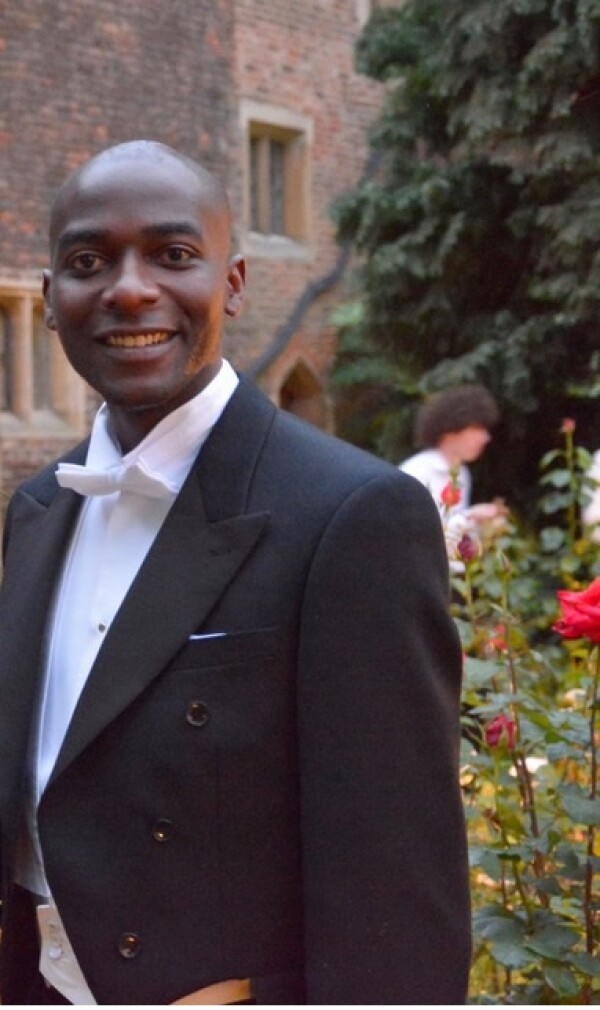
Dr Tonny Okedi
| Full name | Tonny Okedi |
| PhD project | Time series analysis and machine learning studies of biophotovoltaic systems |
| PhD Supervisor (Department) | Dr Adrian Fisher, Department of Electrical Engineering |
| Year of completion | 2021 |
WHERE ARE YOU AT THE MOMENT? |
||
|
I have always been interested in the intersection of art and science. I recently reconnected with an old high school friend who became an incredible industrial designer. We are working together on a project that incorporates the science from my PhD and his designs to develop discursive art pieces to inspire the imagination on the future possibilities of biophotovoltaics (the focus of my research). Career wise, as mentioned above I took part in the Cambridge Judge Business School pre-Accelerate and Accelerate programs where I caught the entrepreneurship and investment bug and decided to build my post-PhD career in the world of investing. I secured a role prior to submitting my thesis with a London-based investment firm where I now work. |
||
WHAT IS YOUR MOST MEMORABLE ASPECT OF CAMBRIDGE LIFE |
||
|
That would definitely be the diversity of intellectual interests that you get exposed to. The college system really lends itself well to concentrated and continuous exposure to cutting edge work being undertaken across the whole university, not just in your own department. There aren't many places around the world where you mingle with so many varied ideas on a daily basis, in a casual manner and, if you wish to, in quite some depth. It is however hard to reminisce about my time at Cambridge without acknowledging the impact of the pandemic, which resulted in the majority of my second and third years spent under some form of lock-down or social restrictions. During this time, participating in the Cambridge Judge Business School Accelerate Program to build a business concept with two friends from college really helped me maintain a link to my Cambridge Life even when I was thousands of miles away in Nairobi riding out the worst of the first-wave pandemic. The online community of like-minded Cantabrigians based around the weekly entrepreneur sessions, 'Pitch and Judge', and other virtual activities were an anchor to Cambridge during those uncertain times.
|
||
TELL US ABOUT YOUR EXPERIENCE SINCE LEAVING THE UNIVERSITY OF CAMBRIDGE |
||
|
I have always been interested in the intersection of art and science. I recently reconnected with an old high school friend who became an incredible industrial designer. We are working together on a project that incorporates the science from my PhD and his designs to develop discursive art pieces to inspire the imagination on the future possibilities of biophotovoltaics (the focus of my research). Career wise, as mentioned above I took part in the Cambridge Judge Business School pre-Accelerate and Accelerate programs where I caught the entrepreneurship and investment bug and decided to build my post-PhD career in the world of investing. I secured a role prior to submitting my thesis with a London-based investment firm where I now work.
|
||
HOW DID THE CAMBRIDGE-AFRICA SCHOLARSHIP CONTRIBUTE TO YOUR CAMBRIDGE EXPERIENCE AND CAREET DEVELOPMENT? |
||
|
Fundamentally, the Cambridge-Africa award allowed me to concentrate fully on my academic and student life without having to worry about my tuition or living costs. This meant that my free time could be used to immerse myself in the extracurricular activities I was interested in, or even just to take a moment to breathe and reflect after an intense period of experimentation, for example. The outcome was that I was able to submit my thesis within three years, while simultaneously having quite a wholesome Cambridge experience along the way. The award also contributed to conference attendance, including to the flagship conference in my field held in Japan in 2019 (where I grew my academic network significantly), and contributed to publishing my research open access, which would otherwise have been less accessible behind a pay-wall (and in a second choice journal). Additionally, through the Cambridge-Africa ALBORADA grant, I contributed to kick-starting a project in my hometown Nairobi in collaboration with the national rare disease organisation (RDK) and the leading national medical research institution, KEMRI, to expand research in the largely white space area of rare diseases in Kenya. While this was not directly related to my PhD, it was personally the most full-filling extracurricular project I took on during my time in Cambridge due the potential impact of the intended outcomes of the on-going project. This includes defining, for the first time, a nationally recognised definition of a rare disease in the country. This may seem small, but it is the first step towards improving access to and delivery of healthcare to those living with rare conditions in the country. Finally, the scholarship was an opportunity to be part of an incredible community of scholars, past, present and future. |
||
ALUMNI WISDOM (what can you tell current Cambridge-Africa PhD scholars) |
||
|
Don't be too rigid with your plans! There’s a good chance that the plans you made prior to arriving in Cambridge were made without having the full purview of what is available to you within the university community. Evolve, grow, and adapt to new opportunities that come your way. At the end of the day, the PhD is your project. Trust your instinct - you’re the one best placed to make a call on the direction of your work as you progress. |
||
Publications |
||
|
Decomposing biophotovoltaic current density profiles using the Hilbert-Huang transform reveals influences of circadian clock on cyanobacteria exoelectrogenesis. Scientific reports 2022-06-29 DOI: 10.1038/s41598-022-15111-y PMID: 35768500 Time series analysis and long short-term memory (LSTM) network prediction of BPV current density Energy & Environmental Science 2021 | Journal article DOI: 10.1039/D0EE02970J CONTRIBUTORS: Tonny I. Okedi; Adrian C. Fisher Green notes: The rhythms of cyanobacteria exoelectrogenesis as de-composed by the Hilbert-Huang transform2021-10-24 | DOI: 10.1101/2021.10.22.465414 CONTRIBUTORS: Tonny Okedi; Kamran Yunus; Adrian Fisher Quantitative analysis of the effects of morphological changes on extracellular electron transfer rates in cyanobacteria Biotechnology for Biofuels 2020-12 | Journal article DOI: 10.1186/s13068-020-01788-8 CONTRIBUTORS: Tonny I. Okedi; Adrian C. Fisher; Kamran Yunus= Development of a polymer electrolyte fuel cell dead-ended anode purge strategy for use with a nitrogen-containing hydrogen gas supply International Journal of Hydrogen Energy 2017-05 | Journal article DOI: 10.1016/j.ijhydene.2016.11.081 Part of ISSN: 0360-3199 |
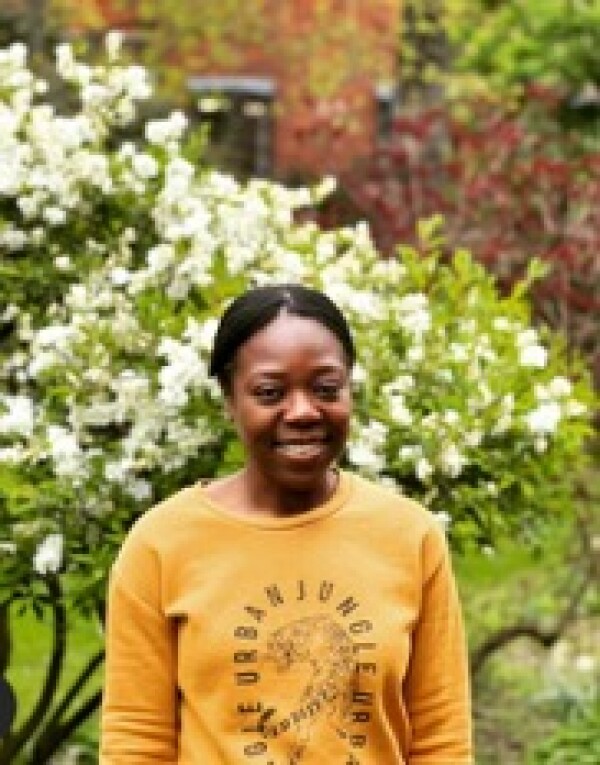
Dr Chilombo Musa
| Full name | Chilombo Musa |
| PhD project | The evolution of land and housing markets in informal settlements in Zambia: An analysis of formal and informal institutions. |
| PhD Supervisor (Department) | Dr Gemma Burgess, Department of Land Economy |
| Year of completion | 2023 |
| chilombo.m.musa@gmail.com |
WHERE ARE YOU AT THE MOMENT? |
|
I am currently exploring opportunities to further my research by communicating directly with policymakers. I am interested in engaging with stakeholders in government departments and think tanks to collaborate and create effective strategies and frameworks that can enhance the living conditions of low-income families in urban areas. I am also working with creative NGOs in Zambia that aim to generate social change and development through various cause-related campaigns. I work on developing products and packages for behavioural change campaigns and provide strategic support to researchers and implementors. |
TELL US ABOUT YOUR TIME AT THE UNIVERSITY OF CAMBRIDGE |
|
My undergraduate degree provided the foundation for my current research interests. At the time, I was interested in a career in property investment and development, and had no idea how this would change three years later when I started a master’s in development studies. I was introduced to a world of development theory where I interrogated how societies develop and progress over time. I was now interested in broader subjects on the social and political dimensions of societies. I knew I still wanted to work on subjects related to property, but I was now interested in understanding how people interact with the built environment. Following years of research and teaching, I decided to pursue a PhD and was drawn to the Department of Land Economy at Cambridge due to its interdisciplinary approach. I have many fond memories of my time there, but winning the best presentation award at the Land Economy Early Career Researchers' Conference in my first year was particularly noteworthy. It was a significant milestone that affirmed the value of my research. While studying at Cambridge, a fellow student and I registered a society, the Cambridge Initiative of African Urbanism, which is a platform for exploring various aspects of urbanism in African cities and urban areas. The society explores different aspects of urbanism from climate change to religion and faith, gender and sexuality, food and urban health, and conflict and peace. I wish to continue engaging with these topics beyond the PhD. |
TELL US ABOUT YOUR EXPERIENCE SINCE LEAVING THE UNIVERSITY OF CAMBRIDGE |
|
During the final months of my PhD, I developed a deep interest in sustainable and responsible investment and began exploring the concept of Environment, Social, and Governance (ESG). I was fascinated by the conversations surrounding the importance of incorporating ESG principles into company operations, and I became passionate about exploring ways in which I could contribute to furthering research and knowledge on ESG in land-based investments, such as housing developments. To expand my understanding of this field, I proactively reached out to experts in this area, engaged in discussions with them, and attended various webinars on the topic. Through these experiences, I gained new insights and perspectives that shifted my long-term career goals in unexpected ways. Pursuing my PhD at Cambridge has opened my eyes to a wide range of subjects, and has enabled me to contemplate career paths that I never previously considered. |
ALUMNI WISDOM (what can you tell current Cambridge-Africa PhD scholars) |
|
The PhD is a fun process with so many opportunities to explore subjects, connect with people, and make friends from around the world. Be open-minded and willing to learn. Studying at the University of Cambridge provides a great opportunity to grow as a researcher, so take advantage of the opportunities and resources on offer. Cambridge has a strong African community and connecting with other students can help you feel more at home and provide a supportive network. Finally, believe in yourself. The PhD is a challenging but rewarding journey that requires perseverance, resilience, and determination. The process is worth it! |
Publications |
|
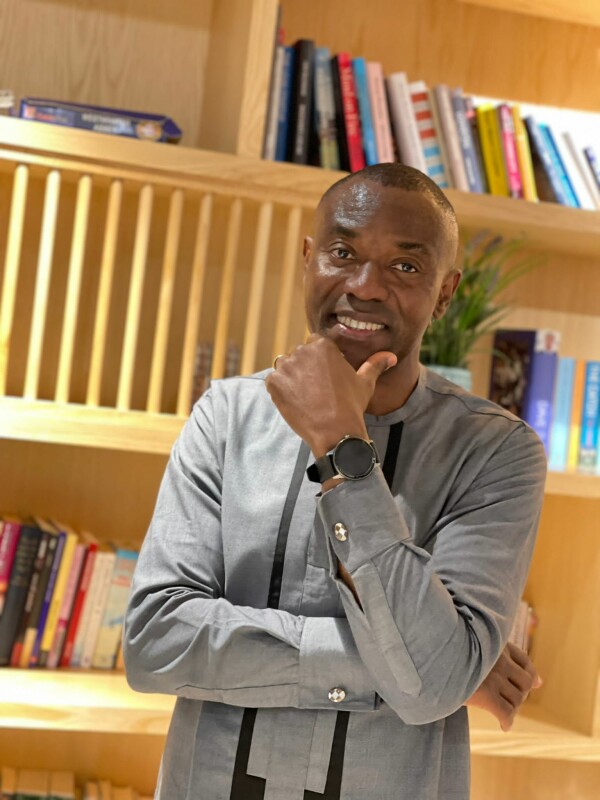
Dr Emmanuel Sowatey
| Full name | Emmanuel Addo Sowatey |
| PhD project | Corruption and police recruits in Ghana:A qualitative longitudinal study |
| PhD Supervisor (Department) | Prof. Justice Tankebe |
| Year of completion | 2024 |
| Emmanuel.sowatey@gmail.com |
WHERE ARE YOU AT THE MOMENT? |
|
|
Just returned from a United Nations Mission (UNDP, to be precise) in Malawi, helping to establish their National Infrastructure for Peace. I am engaged in some research activities between informal traders and security personnel along Ghana’s borders in the Upper East and Upper West regions of Ghana. This project is being funded by the Alborada Research Fund. For some media coverage, see https://gna.org.gh/2025/07/ngo-calls-for-security-trader-collaboration-along-borders-in-upper-west-region/ for the workshop in the Upper East Region. Also, on the other workshop in the Upper East Region, visit https://www.africansecuritynetwork.org/assn/assn-strengthens-security-trader-collaboration-in-ghana/. African Security Sector Network (ASSN), where I work also has the story at https://www.africansecuritynetwork.org/assn/assn-strengthens-security-trader-collaboration-in-ghana/. It was exciting to be back home, but the kids are grown, and I seem to have missed that part of their ages where the opportunity of bonding is brighter. But I am trying to catch up. Then, also, I am gradually settling back into my pastoral role after almost 6 years away pursuing my PhD. |
|
TELL US ABOUT YOUR TIME AT THE UNIVERSITY OF CAMBRIDGE |
|
|
|
TELL US ABOUT YOUR EXPERIENCE SINCE LEAVING THE UNIVERSITY OF CAMBRIDGE |
|
|
Concerning my job, I have just returned from a United Nations Mission (UNDP, to be precise) in Malawi, helping to establish their National Infrastructure for Peace. I am engaged in some research activities between informal traders and security personnel along Ghana’s borders in the Upper East and Upper West regions of Ghana. This project is being funded by the Alborada Research Fund. For some media coverage, see https://gna.org.gh/2025/07/ngo-calls-for-security-trader-collaboration-along-borders-in-upper-west-region/ for the workshop in the Upper East Region. Also, on the other workshop in the Upper East Region, visit https://www.africansecuritynetwork.org/assn/assn-strengthens-security-trader-collaboration-in-ghana/ The Upper East and Upper West regions are vital entry points to the Sahel Regions of West Africa that provide a lot of food to Ghana (and other countries in the region) but are currently the centre of terrorist activities (On the fatalities of terrorist activities in the region, see https://africacenter.org/spotlight/en-2025-mig-10-year/ . The nature of the threats and their consequences on West Africa and Ghana, has meant the timeliness of this ‘mini-project' has generated keen interest among civil society, traders and government. The stakeholders have stated in clear terms that they want us to build on the preliminary success of opening up this unique space for direct dialogue that has been designed to enhance the legitimacy of the security agencies. Such legitimacy will help improve both security and the facilitation of trade. This success was made possible by the seed funding from the Cambridge-Africa Alborada Research Fund. I am hoping to get funding from diverse places to build and sustain the gains made from this project, which stems from the findings of my PhD project. The players from the informal sector and security agencies who participated in the workshops said this was a really new endeavour that will help gradually address their strained relationship, and ultimately, strengthen the legitimacy of the security agencies (including the police). They all admitted this healthy relationship between them was the foundation required for good governance and economic development, peace and stability. |
|
ALUMNI WISDOM (what can you tell current Cambridge-Africa PhD scholars) |
|
|
Coming to Cambridge is definitely worth the sacrifice – go for it!. No age is too early or too late. Africa needs to boost its human resource capabilities to be more influential and effective global player. She is waiting for you to be one more gem/prodigy in her vault. So, I repeat, go for it!: come to Cambridge – and help develop Africa with speed! |
|
Publications |
|
|
I currently have two publications under review. |

